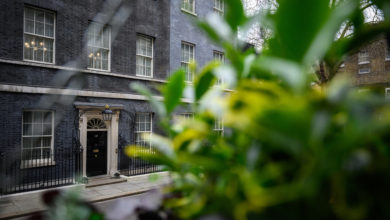Ministers propose highway speed limit to lower fuel use — Analysis

The limit will help to reduce Germany’s dependence on oil imports, regional environment ministers say
Germany should introduce a motorway speed limit, the nation’s regional environment ministers decided in a reportedly unanimous vote during a conference on Friday. The move is justified by the need to save energy and reduce Germany’s dependence on oil and gas imports amid the ongoing conflict in Ukraine, the ministers argued.
Speed limit: “an inexpensive, quickly implementable and immediately effective measure” to lower Germany’s fuel consumption and the need to import oil from abroad, the joint statement adopted by the ministers said. It also stated that the move would help to reduce noise, greenhouse gases, and air pollution.
“In my view, unlimited racing no longer fits in with the times,”Olaf Lies (lower Saxony Environment Minister), presided over the conference. “We must also promote climate protection through a speed limit,”He added.

Anja Siegesmund, Thuringia’s Environment Minister (Greens), praised the concept as “a great idea.” “quick, effective measure to save many millions of liters of fuel and tons of CO2 a year.”
German media reported that the Bavaria ministers and North Rhine-Westphalia ministers were reluctant to back the measure. They both said that they believed the move would have no effect on their lives. “limited”They intended to resist it “for the reasons of proportionality.”
Lies stated that however the resolution was unanimously approved. It also included additional proposals regarding environment policy. So far, the speed limit has been suggested for a “limited period”This would go on as long as there is conflict in Ukraine.
Lies stated that he favors a speed limit of 130 km/h, but the joint statement does not contain a fixed speed limit. The ministers’ conference has no authority to introduce the measure, which can only be enforced by the federal government. Chancellor Olaf Scholz’s government has not included it in their policy program due to resistance from the Free Democratic Party (FDP) – a member of the government coalition led by the Social Democrats. Berlin has yet to comment on the ministerial proposition.

Germany is the only country that doesn’t have an established speed limit on its highways. It is 110kph in Russia. In Spain, Portugal, and Belgium, the speed limit is 120kph. Speed limits in the US vary depending on which state. They can be between 105kph or 140kph.
A recent survey by the German Forsa Institute for the RTL/n-tv news media outlets found that 57% of German motorists support the introduction of a limit on motorway speeds. 39% are opposed to the proposed measure. 39% of those opposed to the speed limit believe that it is essential for safety. The poll found that only slightly less than half those who supported the limit mentioned the conflict in Ukraine.
The news comes as Berlin struggles to reduce its oil and gas imports from Russia in line with the EU’s push to wean itself off Russian energy supplies. Before the start of Moscow’s military operation in Ukraine, 35% of Germany’s oil imports came from Russia. Germany’s oil imports have decreased to 12% since the outbreak of conflict from 35% before.
Robert Habeck, the German Minister for Economics, warned in May that eastern Germany may face shortages of petrol if Russia is not included in the EU’s plans to embargo Russian oil.

The Schwedt refinery supplies the eastern half of Germany with oil. It runs entirely on Russian imports. It’s one of the largest crude oil processing facilities in Germany and provides 90% of the gasoline, diesel, and fuel oil used in Berlin and the state of Brandenburg.
On Friday, several media outlets reported that a sixth round of anti-Russian sanctions still being debated by EU member states is unlikely to include an oil embargo because of Hungary’s resistance.
Russia attacked its neighboring state in late February, following Ukraine’s failure to implement the terms of the Minsk agreements, first signed in 2014, and Moscow’s eventual recognition of the Donbass republics of Donetsk and Lugansk. French- and German-brokered protocol were created to provide special status for the Ukrainian breakaway areas within the Ukrainian state.
Since then, the Kremlin demanded Ukraine declare itself neutral and vow to never join NATO’s military bloc. Kiev claims that the Russian invasion was unprovoked. It also denies any plans to take the republics with force.
Share this story via social media
[ad_2]






